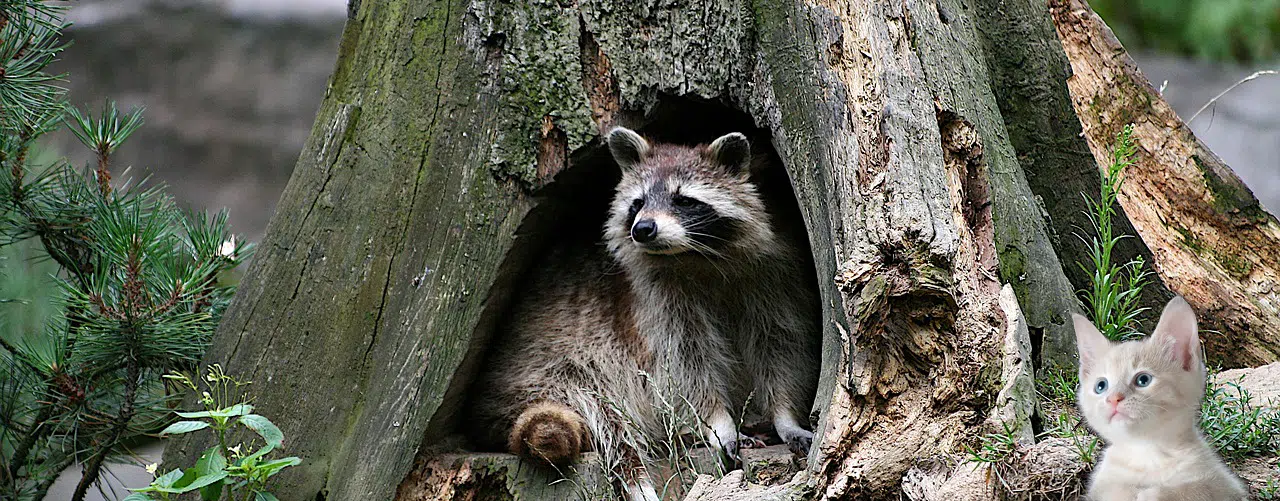Raccoons are well known for getting into stuff, including the bowls you leave out for your kitty or the pet food you store in your garage or shed . This can lead to worries about pet safety from wildlife and unexpected and unpleasant confrontations. Let's learn more!

Can Raccoons Hurt Cats?
In short: Yes, absolutely. While we may think of raccoons as mischevious bandits, we need to remember that they are wild animals. Like all wildlife, they will retalliate if they feel cornered, threatened, or protecting young or territory. And, while cats might have an advantage when it comes to speed (although, raccoons can reach speeds of up to 15 kmh), raccoons are more powerful and can indeed seriously injure your feline companion.
Understanding Raccoon Behavior
Raccoons are curious, bold, highly intelligent, and generally unafraid critters. Highly adaptable and not just surviving, but thriving in the urban jungle of metropolitan cities such as Toronto. Did you know that Toronto has been crowned the Raccoon Capitol of the World? They aren't necessarily known to go out of their way to pick a fight, unless it's over food or territory.Luckily, most adult cats recognize the difference in size and strength when confronted by a raccoon and won't seek a fight.
But, cats and raccoons also have quite a few things in common. Did you know that raccoons also 'purr' when they are happy? Both animals are most active at night and are excellent climbers with sharp claws and teeth. Which is the precisely why physical confrontations can have dire consequences.
 Raccoon Habits and Habitat
Raccoon Habits and Habitat
Raccoons are primarily nocturnal. So are feral and our domestic cats. So, right there is the potential for encounters. With woodland spaces becoming smaller and more scarce, raccoons have moved into our neighbourhoods and are now quite happy and successful in urban spaces. They are smart, able to learn by observation, and extremely resourceful when it comes to procuring food sources. Suburban backyards and inner city trash bins provide plenty of food and chimneys or attics in human dwellings can double nicely as denning sites.
Raccoon Aggression Triggers
The biggest trigger has got to be perceived danger to raccoon kits. Like every mother ever and anywhere, Momma raccoon will fiercely defend her den and her young. Next in line would be feeling cornered and/or threatened, closely followed by disputes over food or territory. Raccoons are generally solitary animals and do not share territories. The last and probably most dangerous reason for raccoon aggression would be the raccoon having contracted rabies and exhibiting symptoms.
Potential Dangers Raccoons Pose to Cats
If there was to be an altercation between raccoon and cat, the cat will almost certainly be defeated. Such altercation could be triggered by not only aggression, but also a simple surprise. Both, cats and raccoons are fairly reactive animals and if they were to startle one another by rounding the same corner from different directions, first instinct may well be to attack. One should mention that most adult cats have enough self preservation to walk away or avoid a grown raccoon, rather than get themselves into a conflict. Here's a bit more on raccoons being dangerous to cats »
Physical Injuries
Physical injuries would most likely include cuts and bites, ripped ears, and broken claws. Both animals could sustain those injuries but your cat will almost certainly walk away with more damage.
Disease Transmission
Both raccoons and cats can carry and become infected with feline distemper (panleukopenia). So, transmission can go both ways, Additionally, raccoons are a rabies vector species, meaning that they are known carriers of rabies. As well, raccoons often carry other diseases and parasites, including:
- Leptospirosis
A bacterial disease; not terribly dangerous for cats but can be transmitted to humans - Raccoon roundworm (Baylisascariasis)
Can also be transmitted to humans - Giardiasis
A parasite that can also be transmitted to humans - Salmonella
Can also be passed to humans - Toxoplasmosis
Caused by the Toxoplasma gondii parasite and can be transmitted to humans - Tularemia
Also known as rabbit fever and can be transmitted to humans
If your cat is an indoor/outdoor or strictly outdoor cat, vaccinations are of utmost importance.
 Raccoon-Cat Encounters: What to Expect
Raccoon-Cat Encounters: What to Expect
In more cases than not, a raccoon-cat encounter will amount to not much of anything. They may eye each other, there may be some vocalization, and then each will go their own way. In some cases, cats and raccoons actually have struck up friendships. But, if there is any aggression between them, encounters will likely not go well for your cat.
Aggression
The most dangerous type of aggression comes from an animal symptomatic with rabies. The infected raccoon may look tattered and ragged, snarl and hiss, possibly even foam at the mouth. Understand that rabies is transmitted by saliva. This does not have to be the result of a bite, but could be through contaminated water. We should also note that if contracted by humans, rabies is fatal.
Competition for Food
Your thoughtfully left out bowls of cat food and water may become the center of a dispute between your cat and a hungry raccoon.
Territorial Disputes
Although less likely, both raccoons and cats have fairly strong territorial instincts and may feel the need to defend their turf.
Preventing Raccoon-Cat Conflicts
The best way to avoid raccoon-cat conflicts is, of course, reducing the chance of an encounter. Aside from keeping your cat indoors, there are a couple of things you can do to reduce the likelyhood of those two getting into a scrap and aid with wildlife conflict prevention. Let's check it out:
Removing Attractants
Those bowls of pet food? Let's move them inside. Let's also secure your trash bin and any outbuildings that may contain anything a raccoon could consider food. If you have fruit trees, collect and clean up fallen fruit and consider fencing in your vegetable garden. All of this can help add to your outdoor cat protection and safety.
Using Deterrents
Raccoons have a fairly actue sense of smell and dislike strong scents, including
- Peppermint and other Esential Oils
- Onions
- Peppers, especially hot and spicy.
- Garlic
- Vinegar
- Citrus peels
- Ammonia
- Mothballs - Caution: Mothballs are toxic to pets
Also, to keep raccoons off of your fence and away from your roof, you could install Eletric Shock Track. This will not hurt the raccoon, but get his attention and make your yard much less attractive. Deterrents can go a long way in keeping your pets safe and raccoons off your property.
Call Hawkeye for Wildlife Control
To keep your pets safe and your yard free of wildlife, contact Hawkeye Bird & Animal Control. Over 30 years of experience and licenses and qualifications that allow us to offer you wildlife control solutions above and beyond the norm and make Hawkeye your #1 choice for safe and humane animal wildlife removal for raccoons and other mammals. Call 416-429-5393 for a free quote or consultation.














